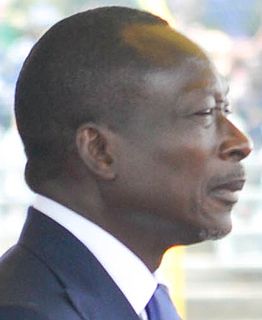
The Politics of Benin take place in the framework of a presidential representative democratic republic, wherein the President of Benin is both head of state and head of government, and of a multi-party system. Executive power is exercised by the government. Legislative power is vested in both the government and the legislature. The Judiciary is independent of the executive and the legislature. The current political system is derived from the 1990 Constitution of Benin and the subsequent transition to democracy in 1991. The Economist Intelligence Unit has rated Benin as "hybrid regime" in 2016.

Émile Derlin Zinsou was a Beninese politician and physician who was the President of Dahomey from 17 July 1968 until 10 December 1969, supported by the military regime that took power in 1967. Zinsou was present at the signing of the treaty that formed the African Union on 12 July 2000 in Togo.

Elections in Benin take place within the framework of a multi-party democracy and a presidential system. Both the President and the National Assembly are directly elected by voters, with elections organised by the Autonomous National Electoral Commission (CENA).
The Democratic Renewal Party is a political party of Benin led by Adrien Houngbédji. Houngbédji lived in exile for several years, but returned to Benin to take part in the National Conference of 1990. He built up his party largely around other exiled Beninese. PRD was legally recognized on September 24, 1990.
The African Movement for Development and Progress is a political party in Benin. In the legislative elections held on 30 March 2003, the party was part of the Presidential Movement, the alliance of supporters of President Mathieu Kérékou, who had won the 2001 presidential election, and won nine out of 83 seats. The President of MADEP is Séfou Fagbohoun, a wealthy businessman.
Adrien Houngbédji is a Beninese politician and the leader of the Democratic Renewal Party, one of Benin's main political parties. He was President of the National Assembly of Benin from 1991 to 1995, Prime Minister of Benin from 1996 to 1998, and President of the National Assembly again from 1999 to 2003. Beginning in 1991, he stood repeatedly as a presidential candidate; he placed second in 2006, but was heavily defeated by Yayi Boni in a second round of voting. Since 2015, he has served for a third time as President of the National Assembly.

Presidential elections were held in Benin on 5 March 2006. Long-time president Mathieu Kérékou was barred from running again by a two-term limit and an age limit of 70 years for candidates; in July 2005 he signalled that he would not seek to change the constitution, as has been done in some other African countries, so that he could run again. Kérékou's long-time rival Nicéphore Soglo was also barred from standing due to his age. With both of the men who had been the country's leading political figures for many years unable to contest the election, it had a level of openness and unpredictability that is uncommon to African presidential elections. Since no candidate won a majority, a second round was held between the two leading candidates on 19 March; Yayi Boni won the election and took office in April.
Kamarou Fassassi was a Beninese politician.
Sacca Lafia is a Beninese politician who has served in the government of Benin as Minister of the Interior since 2016. Previously he was Minister of Mines, Energy, and Water under President Yayi Boni, beginning in 2007. He is President of the Union for Democracy and National Solidarity (UDS), a political party.

Presidential elections were held in Benin on 13 March 2011 after being postponed twice from 27 February and 6 March 2011. Incumbent President Yayi Boni ran for re-election against thirteen other candidates, including former National Assembly head and political veteran Adrien Houngbédji and Abdoulaye Bio-Tchané, president of the West African Development Bank. He won 53.18% of the vote, enough to win a second term without a run-off. It is the first time since the restoration of democracy in Benin that a candidate has won the presidency in a single round. A second round run-off would have been held on 27 March 2011 if it had been necessary.
Pascal Irénée Koupaki is a Beninese politician who served as Prime Minister of Benin from May 2011 to August 2013. Koupaki worked as an official at the Central Bank of West African States (BCEAO) and the International Monetary Fund (IMF), and he was Director of the Cabinet of the Prime Minister from 1996 to 1998. Under President Yayi Boni, Koupaki was Minister of Finance from 2006 to 2007 and then Minister of State for the Exploration, Development, and Evaluation of Public Policy from 2007 to 2011.

This national electoral calendar for the year 2016 lists the national/federal direct elections held in 2016 in all sovereign states and their dependent territories. By-elections are excluded, though national referendums are included.

The G13 Baobab Alliance is a political alliance in Benin.

Presidential elections were held in Equatorial Guinea on 24 April 2016. In a vote initially scheduled for November but brought forward by seven months, incumbent President Teodoro Obiang Nguema Mbasogo retained his office with 93.7 percent of the vote.

Abdoulaye Bio Tchané is a Beninese economist and politician.

Parliamentary elections are scheduled to be held in Benin on 28 April 2019.













